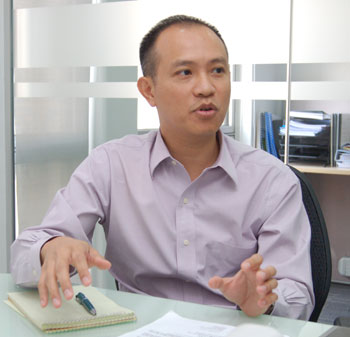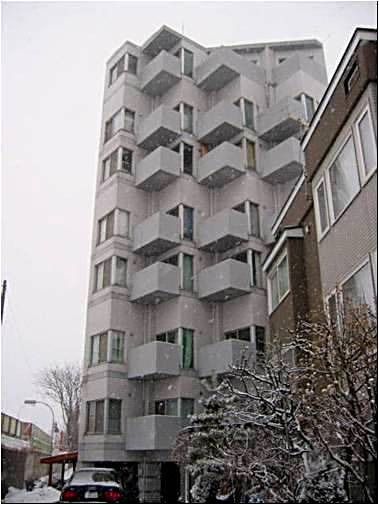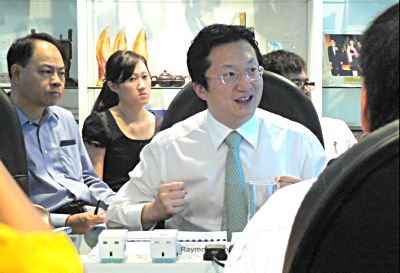DURING A casual Saturday night gathering of several friends, the talk turned (inevitably) to stocks (Cambridge Industrial Trust, Oceanus, GuocoLeisure, etc, some of of which have since risen). One stock that hasn't jumped is Saizen REIT.
It’s a good buy as the worst scenario has been priced in, said one of the guys. Saizen owns 166 residential apartment blocks located in 13 regional cities in Japan.
(If you are unfamiliar with this REIT, read our earlier report on it first by clicking on the link provided at the bottom of this page.)
Its investment merits were lightly discussed over some red wine and green tea in a nice condo in River Valley overlooking the Singapore River.
Intrigued enough, one of the guys, Stephen Chen, did some hard digging over the next few days into public announcements that Saizen REIT has made to understand it better.
He emailed his observations and questions for group discussion, and NextInsight decided to try its luck with the REIT’s CEO, Chang Sean Pey.
He has responded to the questions, most of which revolve around the commercial mortgage-backed securities (CMBS) loans that are coming due. Saizen has the resources to repay all the loans except for one - that which is held by a subsidiary, YK Shintoku, which is due in just two months' time.

Saizen has been selling off properties to pay down YK Shintoku. But the amount raised is only 6% of the YK Shintoku loan. Hence, how easy is it for Saizen to repay / restructure the YK Shintoku loan? Or are they more likely to default on / give up the properties associated with the loan?
Mr Chang: Realistically, we do not believe there can be sufficient sales being conducted prior to maturity to fully repay the YK Shintoku loan. The sales serve to reduce absolute amount and gearing level to one which could be more acceptable to current lenders (for an extension), or to potential lenders (for new loans).
In addition, the sale also serves to demonstrate to potential and current lenders that reasonable prices can be fetched and there is indeed some liquidity (unlike some asset classes where there will virtually be no buyers).
We are trying our best to find a refinancing solution at reasonable terms. Failing which upon default, we will work closely with the loan servicers for a solution such as restructuring or orderly disposal plan – that’s why the recent sales are important to demonstrate this ability.
If Saizen were unable to refinance the YK Shintoku CMBS loan, what is the impact on other YKCMBS loans or bank loans? What is the impact in terms of their industry reputation or credit rating? (eg. banks jack up interest rates, permanent downgrade of credit rating, etc?)
Mr Chang: Defaulting on YK Shintoku will not have any impact on other loans. In terms of reputation, we believe we have demonstrated that we have tried our best but unfortunately given the CMBS structure, any restructuring negotiation is not possible.
In a sense, we did not run away from our responsibility but instead the CMBS market deserted us – the investment bankers which originated these deals are not to be found; the loan servicers and bond trustees which act strictly by the books are not responsive; and the ultimate bondholders (which range from AAA holders to junk holders) each has different and conflicting interests when it comes to restructuring and cannot agree even among themselves.

Mr Chang: Exercise of warrant during the exercise period is solely at the option of warrant holder.
Will level of bank debt have to further increase to pay off the first 5 CMBS loans? (Saizen is already using short-term bridging loans to help repay some of the CMBS.) How much more of the JPY 14.9b in CMBS loans can be converted into bank loans?
Mr Chang: Even if there is totally no financing available, Saizen REIT would still have the ability to fully repay the loans of YK Kokkei, YK Shingen and YK Keizan when they fall due in Nov/ Dec 2009 and Jan 2010; and will repay the short-term bridging loans using internal cash flow shortly thereafter within 6 months. By that time, Saizen REIT will have 5 unencumbered portfolios.
What is the trust mgmt fee structure? Does trust manager share the pain of investors, esp. since they structured the REIT in such a way that has resulted in a cut in DPU?
Mr Chang: The management fee is charged based on 0.5% of property portfolio value. Given that portfolio value has been marked down by around 20% in the past 2 years, our fees have also reduced accordingly.
We would like to take the opportunity to explain the action of suspending dividend to conservecash. As Saizen REIT has only foreign assets and pays taxes in Japan, it does not enjoy the benefit of tax transparency accorded to REITs with Singapore assets. On the flip side, this means that if a Singapore REIT does not pay out 90% of its income, it stands to suffer heavy tax.
We believe there is further reason to do so given that we conducted the rights issue. Instead of paying out dividends and then in turn conduct a larger rights issue, our aim was to raise the minimal amount of money while protecting as much assets as possible; bearing in mind that a larger rights issue will be more dilutive to unitholders who do not have the resources to subscribe. Some other Singapore REITs which conducted rights issue do not, however, have the above flexibility. A larger rights issue also means paying more fees.
The cash conserved and rights proceeds are all designated towards repayment of loans which benefits will accrue to unitholders. Before resolving the refinancing issues, none of these proceeds have been used to acquire more properties at this uncertain time though from our point of view, any further acquisition increases our fees.
We strongly believe distribution is the innate feature of any REIT and the dividend suspension is decided after much consideration – knowing there may well be much criticism.
Stephen Chen’s notes on Saizen REIT: FY09 Review: * Net property income still +17% yoy to JPY 2,914m / $43m. * Net income from operations jumped many-fold to JPY 992m / $14.7m. * Distributable income +5% to JPY 1,789m / $27.8m (if adjusted for JPY 414m in one-off financing costs and loan repayment), but DPU cut to zero. * Net operating cashflow was healthy at JPY 2.7b or +86% yoy, while net investing cashflow was a low JPY 117m vs. a huge JPY 8.4b for FY08 (added 65 buildings in FY08). Bulk of loans obtained and proceeds from rights issue will be used to repay CMBS loans. * Closed FY09 with JPY 7.4b in cash and deposits with cash management agents, JPY 6.9b of debt, and JPY 14.9b of CMBS. * S$ has been weakening against JPY. Outlook: * Saizen expects to settle first 5 CMBS loans as they mature. YK Shintoku CMBS worth JPY 8.0b is the problematic one. Importantly, each CMBS loan is non-recourse to the other properties in the REIT. * Based on information from Saizen’s website, Japan’s residential property rental market is supposed to be less affected by overall economic conditions. * The OECD Composite Leading Indicators for Japan have been increasing since March and further increased in July indicating a recovery in the economy. Hopefully this means that things can only get better for the economy, and for Saizen’s portfolio. Other positive Indicators: * Insiders have been buying post-rights issue. - CEO Chang bought in September units at $0.16 and warrants at $0.075 - Chairman Ip bought in August warrants at $0.075 - Exec Director Raymond bought in June units at $0.125 - V-Nee Yeh has a 20.2% stake in Saizen - Argyle Street Management owns 17.5% of Saizen - Kin Chan (chairman of a listed company) is interested in 17.8% of Saizen through Argyle Street Management |
Recent story: SAIZEN REIT: Net asset value 40 cts, stock price 16 cts







